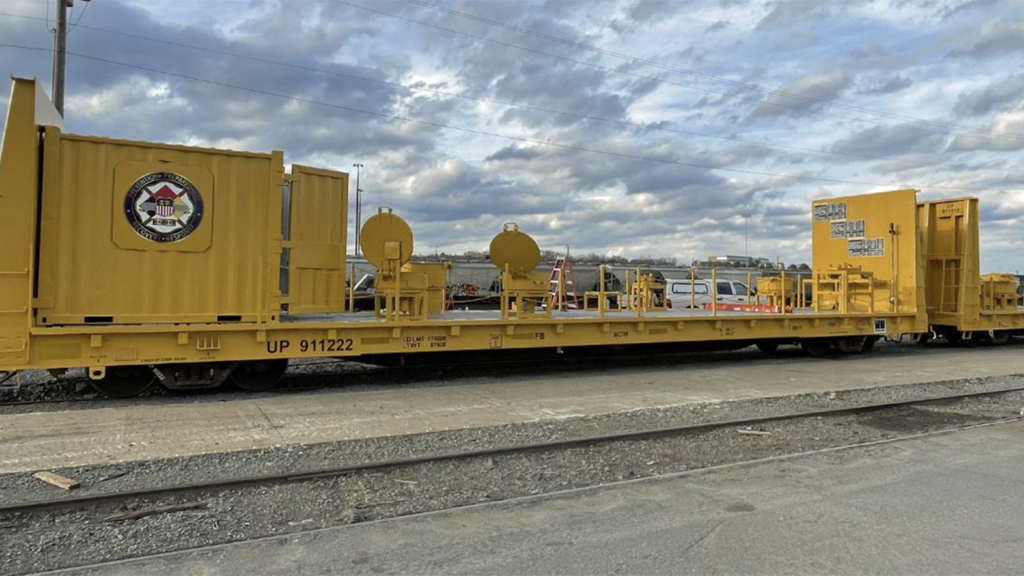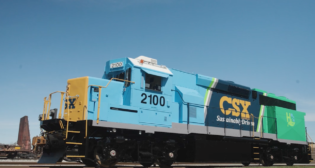
Class I Briefs: CN, UP
Written by Marybeth Luczak, Executive Editor
Derek Gaston, CN’s Terminal Manager, Intermodal/Multimodal Operations at Taschereau Yard, is leading a pilot project to retrofit light trucks to run on propane and gas to reduce emissions.
CN retrofits light trucks to run on propane and gas, as part of its transition plan to a low-carbon economy. Also, Union Pacific (UP) debuts new hazmat-response training railcars built at its De Soto, Mo., shop.
Led by Derek Gaston, Terminal Manager, Intermodal/Multimodal Operations at Taschereau Yard in Montreal, CN in spring 2021 launched a pilot project to test the use of propane as an alternative fuel for fleet vehicles.
“We were looking for ways to improve our trucking fleet as a team, so we researched ways to retrofit two vehicles to help CN reduce its impact on the environment in the short term,” Gaston said.
According to CN, the team reached out to companies that had already retrofitted their fleets through conversion systems that enable gasoline vehicles to also operate on propane. Most kits add fuel-specific supply lines and storage components, and then recalibrate the engine or make software adjustments to the electronic engine control system, the railroad reported.
“Liquefied petroleum gases like propane burn more efficiently and completely than gasoline,” CN said. “That means tailpipe emissions are mostly carbon dioxide and water—and virtually no soot, creating a healthier environment for drivers and communities. Because propane is a much denser fuel, vehicles need less of it to operate.”
In less than three days, a Ford F-150 and a Ford Explorer were transformed into hybrid models that could consume propane. Gaston explained that the team put a propane tank in the back of the Ford F-150’s bed, which took up about one foot of space; the rest of the kit was stored underneath the hood and controlled by two computers.
Both vehicles now start up on gas until the propane system warms up and then switch to propane. A button installed on the dashboard allows drivers to manually change from propane to gas, and a pressure gauge shows how much is left in the tank before it switches back to gasoline, according to CN.
Gaston’s team has already saved thousands of dollars in fuel costs on the Ford F-150 alone, the railroad reported. “I got 10,000 kilometers off one gas tank, which is amazing,” Gaston said. “Safety is always our primary concern, and we discovered that propane tanks are 20 times more puncture-resistant than gasoline tanks.”
The team is looking to expand the pilot project to several more vehicles in 2023, according to CN.
“I just got a brand-new Ford F-150 work vehicle, and I’ll be doing a retrofit on it, too,” Gaston said.
Other members of the project team are:
- Nicolas Capano, Fleet Management Maintenance, Montreal, QC
- Thomas Hennig, Consumer Product Supply Chain Trucking IM Network Operations, Edmonton, AB
- Tony Karlzen, Fleet Management Operations Garages and Maintenance Planning, Brampton, ON
- Keyur Patel, Fuel Management, Montreal, QC
- Carlos Perez, Fleet Management, Montreal, QC
- Michael Poerio, Fleet Management Asset Management, Harvey, IL
- David Thomas, Strategy, Brampton, ON

UP reported on March 29 that employees at its De Soto, Mo., car shop have produced new training railcars to help first responders and the railroad’s hazmat response contractors learn how to properly enter tank car housings, test for leaks, make repairs and install emergency caps.
Involved in the effort were Jerel Allen, Manager-Mechanical Maintenance; David Call, Manager-Mechanical Maintenance; Chip Heard Jr., Senior Manager-Hazardous Materials; Mark Newton, Manager-Hazmat Management; Michael Oatman, Senior Manager-System Car Facility; and Lane Sekavec, Senior Manager-Hazardous Materials.
“Training equipment like this enhances safety for all while building relationships with our first responder community and regulators,” said Mark Lutz, UP’s Assistant Vice President-Fuel and Environmental Management, Supply Chain.



